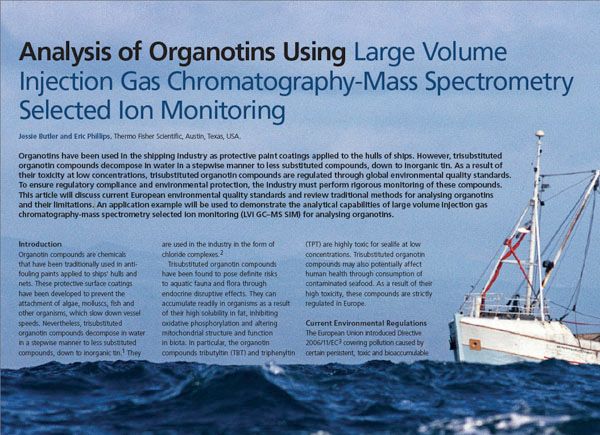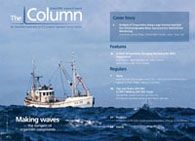Analysis of Organotins Using Large Volume Injection Gas Chromatography-Mass Spectrometry Selected Ion Monitoring
This article will discuss current European environmental quality standards and review traditional methods for analysing organotins and their limitations.
Organotins have been used in the shipping industry as protective paint coatings applied to the hulls of ships. However, trisubstituted organotin compounds decompose in water in a stepwise manner to less substituted compounds, down to inorganic tin. As a result of their toxicity at low concentrations, trisubstituted organotin compounds are regulated through global environmental quality standards. To ensure regulatory compliance and environmental protection, the industry must perform rigorous monitoring of these compounds. This article will discuss current European environmental quality standards and review traditional methods for analysing organotins and their limitations. An application example will be used to demonstrate the analytical capabilities of large volume injection gas chromatography-mass spectrometry selected ion monitoring (LVI GC–MS SIM) for analysing organotins.
New Method Explored for the Detection of CECs in Crops Irrigated with Contaminated Water
April 30th 2025This new study presents a validated QuEChERS–LC-MS/MS method for detecting eight persistent, mobile, and toxic substances in escarole, tomatoes, and tomato leaves irrigated with contaminated water.
University of Tasmania Researchers Explore Haloacetic Acid Determiniation in Water with capLC–MS
April 29th 2025Haloacetic acid detection has become important when analyzing drinking and swimming pool water. University of Tasmania researchers have begun applying capillary liquid chromatography as a means of detecting these substances.

.png&w=3840&q=75)

.png&w=3840&q=75)



.png&w=3840&q=75)



.png&w=3840&q=75)








